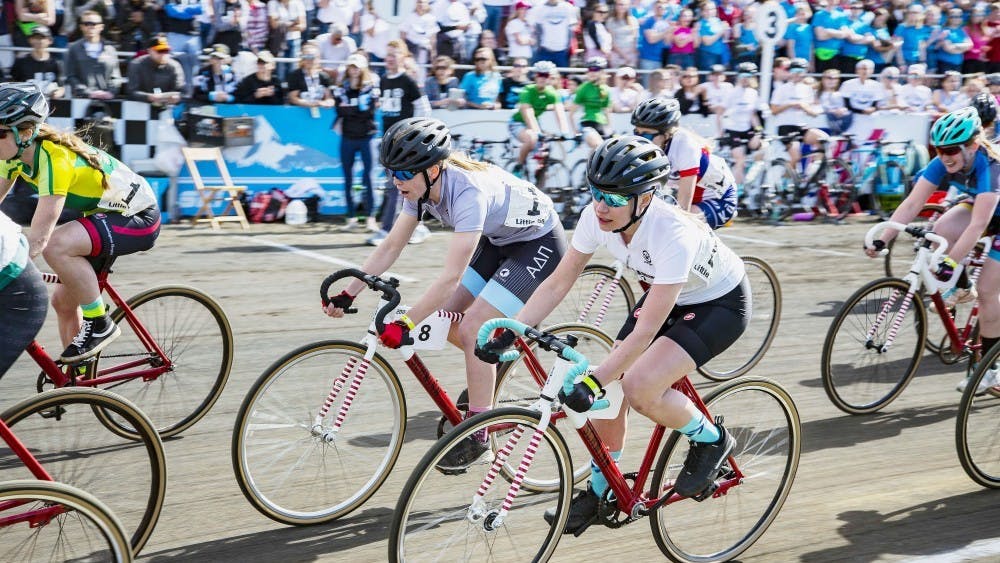IU students advocated for incarcerated individuals Wednesday night at the Bloomington Common Council meeting by posing challenges to change aspects of addiction programs and city policing.
The group of nine students from associate instructor Lindsey Badger’s Public Oral Communication class each were allotted two to three minutes, enforced by the council president, to give abbreviated speeches inspired by collaborations with inmates at the Monroe County Jail.
“Each of us sits as one person between somebody who is incarcerated and feels like they have no voice, and people who are making decisions about their incarceration,” Badger said.
The first to address the council was sophomore Whitney Snyder with the general challenge to increase funding for addiction programs.
The number of offenders on probation for substance-related offenses has continued to rise since 2012, she said. More programs are necessary for increased rates of sobriety. Current programs have high success rates, but they can only accept limited amounts of people.
“Keeping prison people in the continuum, getting incarcerated over and over again, isn’t benefiting anybody,” Snyder said.
Junior Zander Dailey presented an alternative program in which a substance abuser is paired with a recovered abuser. This allows abusers direct control of their lives without government interference, he said.
Senior Lily Feldman challenged the police to transfer addicts to the public health sphere, rather than the criminal justice system.
After each student had gone to the podium, the group exited the room and exchanged congratulations.
Snyder said she was disappointed with the short time limit. Dailey’s and Feldman’s printed essays had entire paragraphs marked out and others highlighted and starred. Feldman had scribbled in the margins which paragraphs to skip if allotted only three minutes to make her point.
The three had been working in the same class group and advocated for harm reduction and sober living.
Their classroom was not in one of the buildings found on an IU map. Each class was at the Monroe County Jail with 10 students from IU and 12 pretrial incarcerated students, said junior Eliot Cremin, another member of their group.
At every visit, the IU students signed in at the jail, had their IDs checked and waited to hear the buzzer that signaled their entrance clearance. All 22 of them sat in a locked room for three hours to discuss criminal justice issues and to practice giving speeches, Feldman said.
“I think that people have this picture of incarcerated people being really rough and rude and weird, but they’re all so sweet,” Snyder said. “After talking to these inmates, I realized how much of an issue these things really are. So, I think it’s really cool that we’re actually able to come here, we’re encouraged to come here to the city council meeting and speak.”
The students attend other public meetings and also facilitate meetings inside the jail.
“It’s a site where we can actually continue the dialogue with the city and make sure that what we do, literally behind locked doors, can be heard and brought out so that other people can engage with some of the ideas that are locked up,” Badger said. “It’s not just people that are locked up. There are a lot of really, really, really good ideas that are locked up.”
The class is a bridge between the jail and community, Badger said.
However, this bridge will no longer exist come next semester.
The specialized section of the class will not be offered because Badger’s major in communication and culture doesn’t match the faculty qualifications to teach the class, she said.
The small group exchanged stories on how the class has affected them.
“I’ve had two classes at IU that have had some kind of an impact on me,” Snyder said.
This class was one of them. It changed her perspective of inmates and made her more open-minded, she said.
Dailey and Feldman said the class altered their future plans.
“Even though I’m not planning on going into criminal justice or advocating, I can still see myself maybe applying to be on my own city council when I do graduate and advocate for the rights of incarcerated people,” Dailey said.
Feldman said she could see herself doing this type of work as a career. She was surprised how much could get accomplished by simply speaking and advocating.
“I haven’t had a student yet, even those who think they’re totally outside the system, leave saying, ‘Oh this doesn’t affect me,’” Badger said.





